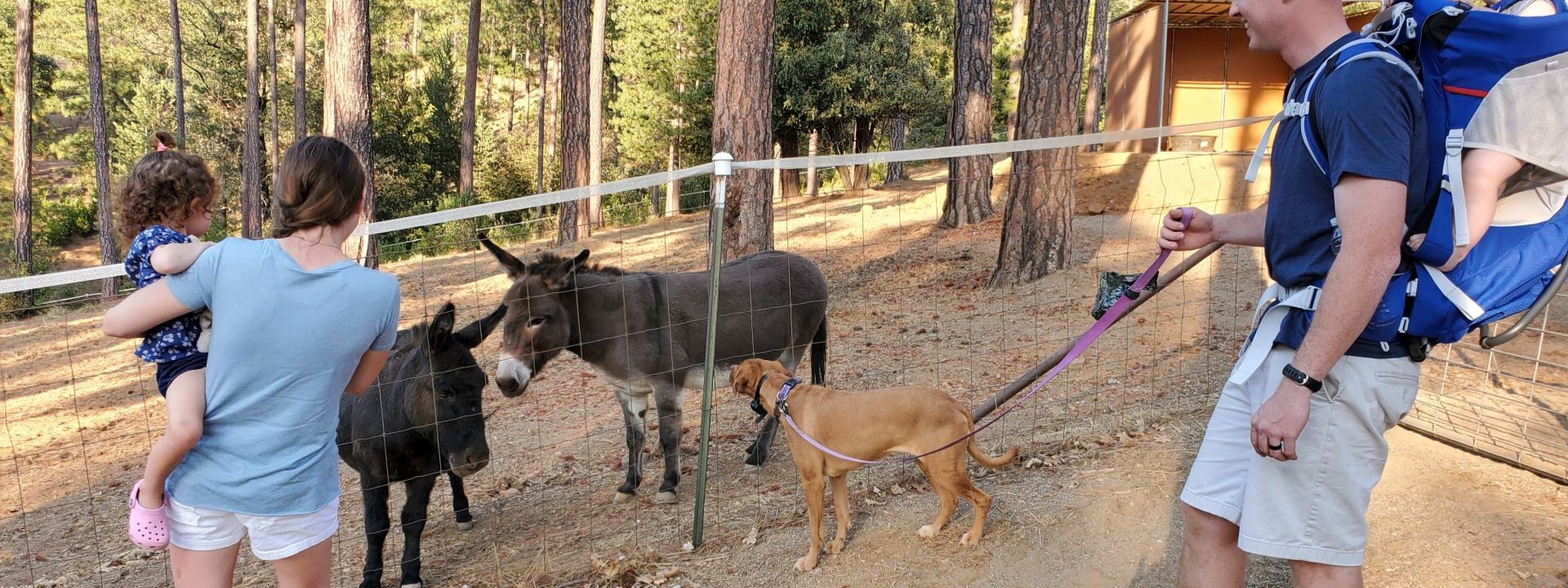Darling Donkeys
By Cyndi | Jan 2025 | Barn Animals
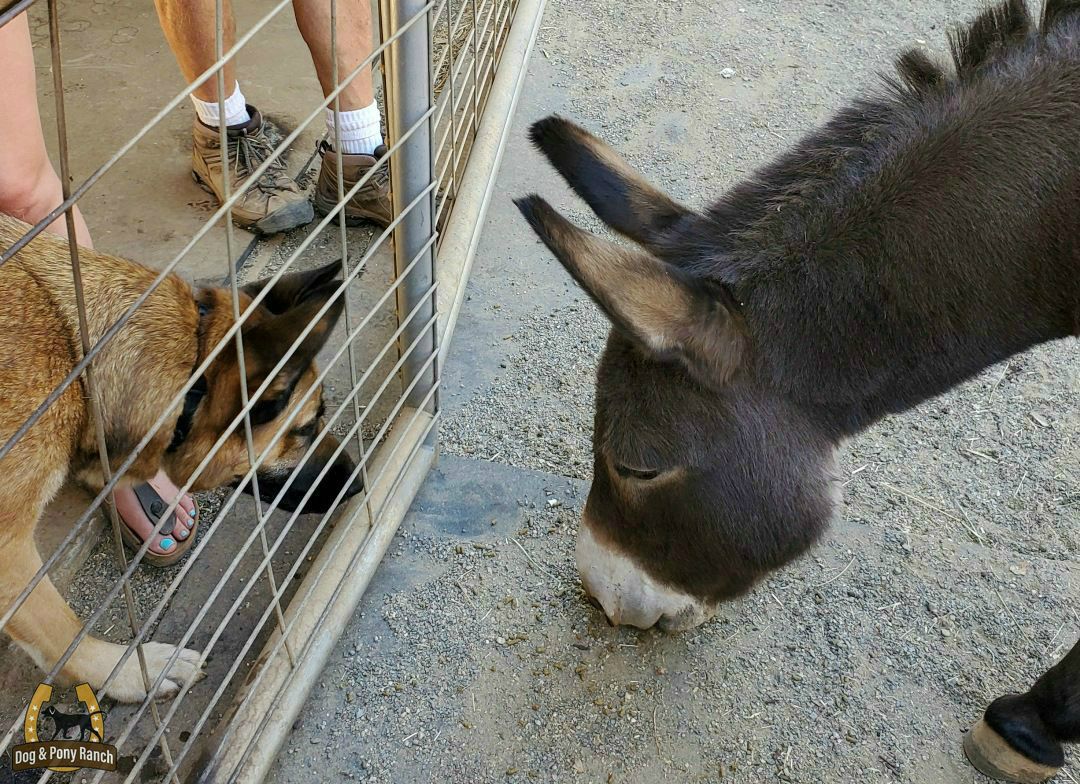 Horses have been an important part of our lives for many decades, so it’s no surprise that I fell in love with their equine cousins, miniature donkeys, when we got to interact with some. It was in 2018 during my birthday getaway to Santa Ynez and a visit to Seeing Spots petting farm so I went home with a very special birthday purchase. Of course, we had thoroughly researched them before our visit, but went home to prepare for adding another species (we had horses, cattle, and llamas at the time) and then brought Millie and Mo home to our ranch where these mini donks quickly became a favorite of our farm-stay guests. Their smaller size makes them much less intimidating than the bigger animals so even the dogs who are afraid of our big horses will want to get nose-to-nose with the mini donks. Millie and Mo are so sweet and gentle taking treats from guests with their soft lips – it’s clear that they enjoy their "petting zoo" jobs.
Horses have been an important part of our lives for many decades, so it’s no surprise that I fell in love with their equine cousins, miniature donkeys, when we got to interact with some. It was in 2018 during my birthday getaway to Santa Ynez and a visit to Seeing Spots petting farm so I went home with a very special birthday purchase. Of course, we had thoroughly researched them before our visit, but went home to prepare for adding another species (we had horses, cattle, and llamas at the time) and then brought Millie and Mo home to our ranch where these mini donks quickly became a favorite of our farm-stay guests. Their smaller size makes them much less intimidating than the bigger animals so even the dogs who are afraid of our big horses will want to get nose-to-nose with the mini donks. Millie and Mo are so sweet and gentle taking treats from guests with their soft lips – it’s clear that they enjoy their "petting zoo" jobs.
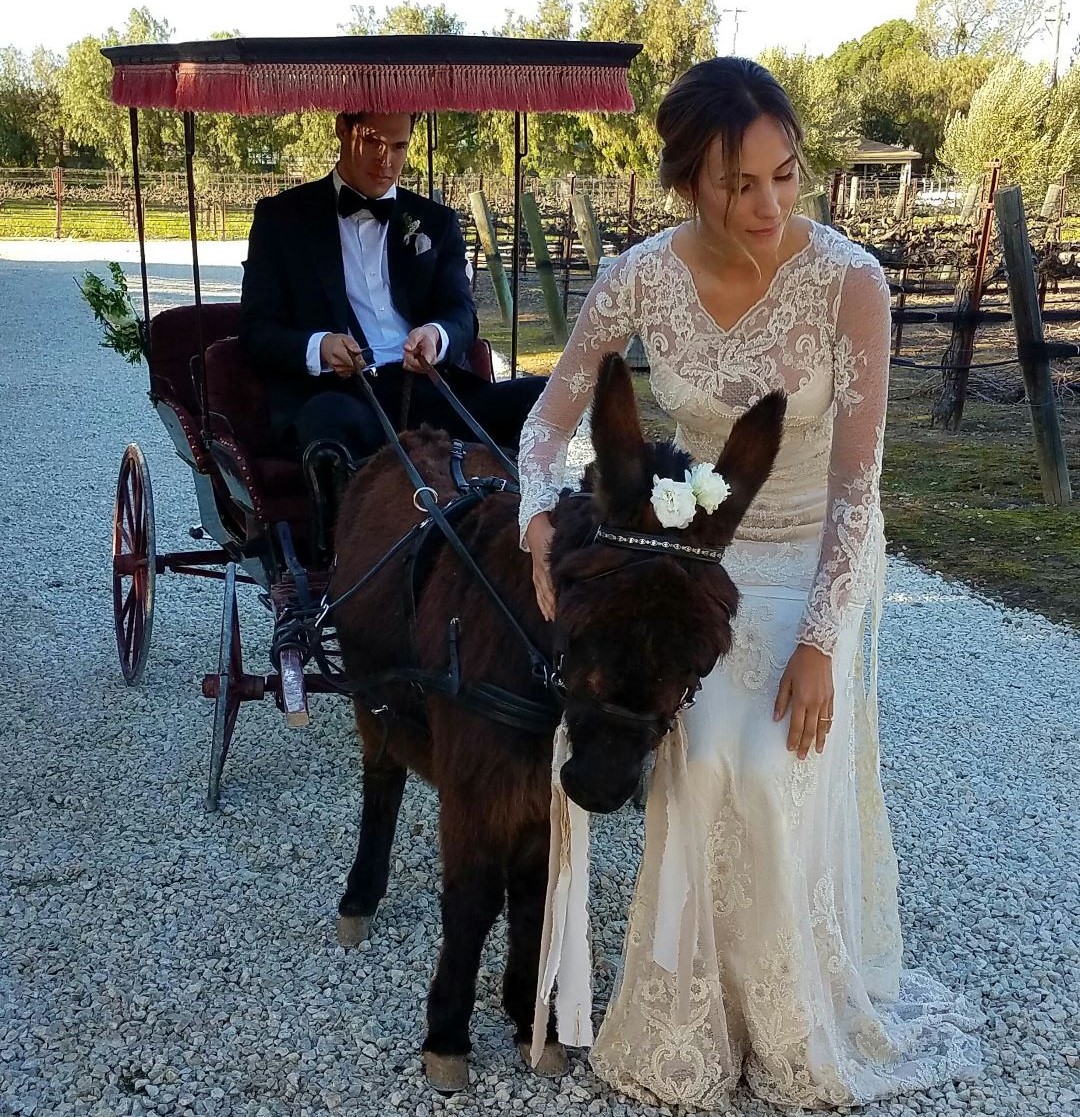 Motown (aka Mo, Mr Mo, Mo-Mo) is a black gelding and a well-trained boy. He's had small children ride on his back so is a unique experience for our smallest guests. He’s had numerous jobs in his 26+ year life including being a breeding stud in Canada (black is an uncommon donkey color so he enjoyed passing along his unique genes) and pulling a wedding cart plus other mini-donk ambassador jobs at Seeing Spots that made him a perfect fit for our guest ranch.
Motown (aka Mo, Mr Mo, Mo-Mo) is a black gelding and a well-trained boy. He's had small children ride on his back so is a unique experience for our smallest guests. He’s had numerous jobs in his 26+ year life including being a breeding stud in Canada (black is an uncommon donkey color so he enjoyed passing along his unique genes) and pulling a wedding cart plus other mini-donk ambassador jobs at Seeing Spots that made him a perfect fit for our guest ranch.
Millie is a female jennet who was rescued from a Texas kill lot so is still more timid but enjoys her new life at our ranch. She has the softest hair with classic donkey coloring, and is very gentle with guests. She’s bigger than Mo, but Mo is clearly in charge as the confident, dominant donkey. With their big expressive ears and distinctive braying, both of our mini donkeys definitely communicate though Millie is the most vocal of our equines which is perhaps her right as the only female surrounded by males!
Domestic donkeys are categorized into sizes measured in “hands” to the withers when fully grown (1 hand = 4 inches when measuring donkeys or horses): miniature donkeys are around 9 hands (<= 36”), standard donkeys are 9-14 hands (36-56”), and mammoth donkeys are 14+ hands (>56”). Donkeys love to eat so we have to be careful with treats since minis tend to get almost as wide as they are tall. Like smaller dogs, miniature donkeys have an even longer lifespan than full-sized equines so often live to 30-35 years old.
Donkeys are known for being “stubborn” which often shows up in their mule offspring as well (mules are donkey-horse crosses). Stubborn is an anthropomorphic description that doesn’t fit the reasons behind the donkey behavior. Donkeys have a strong sense of self-preservation and they “think” more than horses (horses are known for reacting/spooking first before thinking, though also willing to do whatever humans ask of them). Our mini-donks regularly remind us that they will do what they think is in their best interest so we may need to bribe them to go somewhere since we won’t win a pulling battle. We’ve ridden many mules and horses and can definitely appreciate the donkey self-preservation/thinking half of a mule when on a cliff edge like riding down the Grand Canyon.
Donkeys Cross
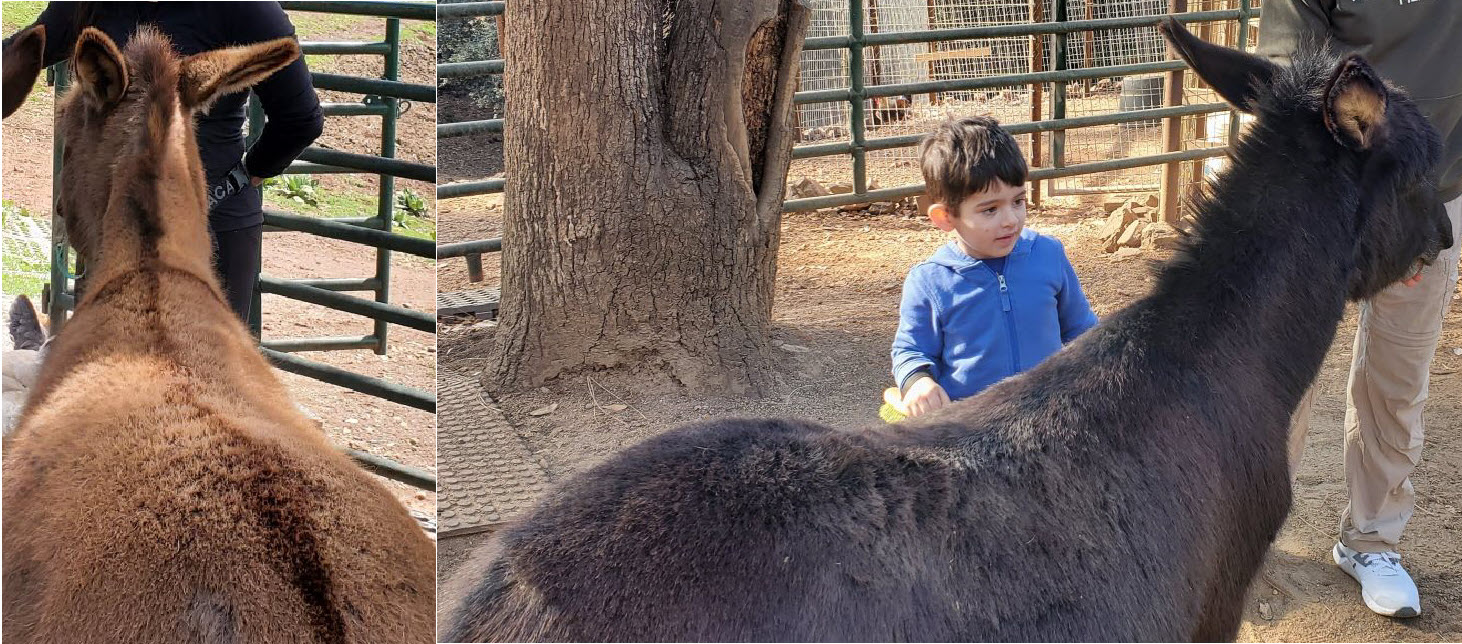
The donkey cross appears on the back and shoulders on all sizes and colors of donkeys. You can sometimes see the darker black cross on Motown’s black hair, though it’s easy to see on Millie’s classic donkey brown/grey coloring. There are several well-circulated donkey cross poems/stories/illustrations and even a children's book which make our donkeys extra special to us suggesting that the donkey markings are a reminder of the cross where Jesus Christ showed His love for us. Here are some of our favorite donkey poems:
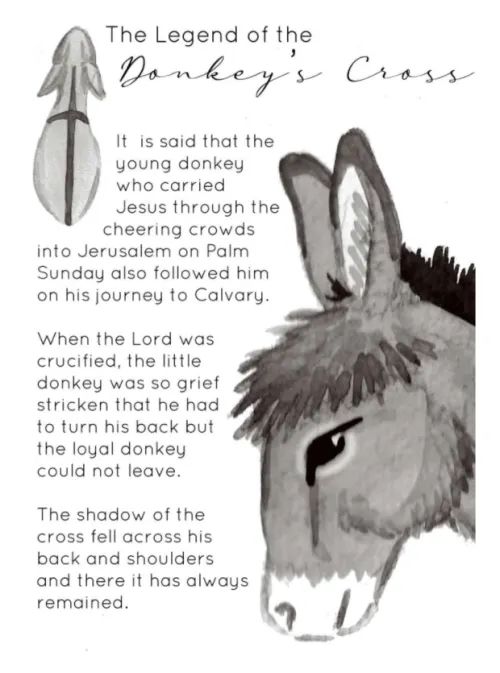
Legend of the Donkey’s Cross by Mary Singer
“Bring me the colt of a donkey,” was the Master’s request.
A young donkey was brought to Jesus to carry Him into Jerusalem.
A week later, Jesus was ordered to be crucified.
The little donkey so loved the Lord, that he wanted to help Him carry the cross.
But, alas, he was pushed away.
The sad little donkey waited to say, goodbye until nearly all had left.
As he turned to leave, the shadow of the cross fell upon the back and shoulders of the little donkey.
And there it has remained, a tribute to the loyalty and love of the humblest of God’s creatures.
Just a Little Donkey, by Rita S. Beer
Just a little donkey, but on my back I bore
The one and only Savior the world was waiting for.
Just a little donkey, but I was strong and proud --
I gladly carried Mary through the chaos of the crowd.
I brought her to a stable where she made a tiny bed…
A place for Baby Jesus to lay His little head.
I pray the world remembers that special Christmas night
When just a little donkey carried Heaven’s Precious Light.
Donkeys in the Bible
Donkeys in the Bible represent service, suffering, peace and humility. Most notable is Jesus Christ riding a donkey on His triumphal entry to Jerusalem documented in the Gospels (Matthew 21:1-9, Mark 11:1-11, Luke 19:28-44, and John 12:12-19) which was a fulfillment of prophecy (“Rejoice greatly, Daughter Zion! Shout, Daughter Jerusalem! See, your king comes to you, righteous and victorious, lowly and riding on a donkey, on a colt, the foal of a donkey.” Zechariah 9:9). Though the Gospel of Luke describes Mary and Joseph traveling from Nazareth to Bethlehem where Jesus was born, the Bible doesn’t mention whether Mary rode a donkey though that is likely and is often pictured.
The Old Testament has several stories where donkeys were significant. Many people have heard the story of Balaam (Numbers 22:21-39) whose donkey saw and refused to go past the angel blocking the path. The LORD allowed the donkey to talk since Balaam couldn’t see the angel. King David returned riding a donkey (2 Samuel 16:2) and his son Solomon rode a mule (donkey/horse crossbreed) when he became the new king of Israel (1 Kings 1:33). Other leaders also rode donkeys at key times (Judges 5:10, Judges 10:4, Judges 12:14) which re-iterates the donkey's symbolism of peace and humility, since leaders going into war more often rode horses. Donkeys are mentioned as early as Genesis 22:3 where a donkey carried the wood for Abraham's sacrifice of Isaac, and Genesis 49:11 with Jacob’s blessing on his son Judah from whose tribe/lineage came Jesus.
God clearly had big plans for these humble creatures! We have been blessed to have some of these animals in our lives, who have been helping people for thousands of years.
